As a health-conscious consumer, I often find myself standing in the beverage aisle, trying to make the best choice for my well-being. I’m sure many of you can relate. One question that frequently crosses my mind is, “Is real fruit juice really real?” With so many options on the market, it’s essential to navigate through the marketing claims and uncover the truth about the fruit juices we consume.
Before diving into the details, let’s briefly explore the benefits of real fruit juice and understand the difference between genuine fruit juice and the artificial alternatives available in stores.
Real fruit juice, made from 100% pure juice, can be a convenient way to incorporate fruits into our diets. These juices can provide essential vitamins and minerals found in fruits, giving us a nutritional boost. However, it’s important to note that real fruit juice lacks dietary fiber—the insoluble part of fruits that aids in digestion and promotes a healthy gut.
Now let’s take a closer look at the nutritional content of real fruit juice and understand how to identify the authentic products amidst a sea of options.
Key Takeaways:
- Real fruit juice made from 100% pure juice lacks dietary fiber.
- Reading the nutrition facts label and ingredient list can help in making a healthy choice.
- Real fruit juice provides essential vitamins and minerals but should be consumed in moderation due to its high sugar content.
- Artificial juice may contain fruit juice blends, added sugars, artificial flavors, and water.
- Prioritize whole fruits and vegetables for their dietary fiber content.
Understanding Nutritional Content of Real Fruit Juice
When it comes to our health, the nutritional value of the food and beverages we consume plays a vital role. Real fruit juice, made from 100% pure fruit, offers a plethora of essential vitamins and minerals that can contribute to a well-balanced diet.
One of the key benefits of real fruit juice is its high content of vitamins, including vitamin C. For example, a single serving of 100% orange juice can provide you with 100% of the daily recommended intake of vitamin C. This powerful antioxidant helps support a healthy immune system and promotes collagen synthesis for healthy skin.
Fruit juices can also be a good source of minerals like potassium. Potassium is an electrolyte that aids in maintaining proper fluid balance, nerve function, and muscle contractions. By including real fruit juice in your diet, you can easily increase your intake of these important nutrients.
However, it’s worth noting that fruit juices lack dietary fiber. During the juicing process, the fiber found in whole fruits is removed, leaving behind the juice concentrate. While fiber is an essential component of a healthy diet, providing numerous benefits such as improved digestion and weight management, real fruit juice should not be relied upon as a sole source of fiber.
To give you a clearer understanding of the nutritional content of real fruit juice, I’ve prepared a table outlining some common vitamins and minerals found in popular fruit juices:
| Fruit Juice | Vitamins | Minerals |
|---|---|---|
| Orange Juice | Vitamin C | Potassium |
| Apple Juice | Vitamin C, Vitamin A | Calcium, Magnesium |
| Grapefruit Juice | Vitamin C, Vitamin A | Potassium, Iron |
| Pineapple Juice | Vitamin C, Vitamin B6 | Manganese |
As you can see, different fruit juices offer varying combinations of vitamins and minerals. By incorporating a variety of real fruit juices into your diet, you can enjoy a wide range of nutrients and flavors.
Identifying Real Fruit Juice
To ensure that you are purchasing real fruit juice, it is essential to read the ingredient list and nutrition facts label. Here are some key steps to help you identify real fruit juice:
- Check the ingredient list: Look for a list of ingredients that indicates 100% fruit juice without added sugars or artificial flavors. Avoid juices that contain additives or preservatives.
- Read the nutrition facts label: The nutrition facts label provides information about the serving size, calorie content, and nutrient composition of the juice. Pay attention to the total sugar content and the percentage of fruit juice in the product.
- Beware of juice from concentrate: Water may be added to juice concentrates to reconstitute them. While this is a common practice, be aware that the concentration level affects the overall percentage of fruit juice in the product.
By following these guidelines, you can make more informed choices when buying fruit juice and ensure that you are getting a product made from real fruit.
The Importance of Consuming Real Fruit Juice
When it comes to incorporating fruits into your diet, consuming real fruit juice provides a convenient and delicious option. Real fruit juice is not only refreshing but also offers numerous benefits for your overall health. By including real fruit juice in your daily routine, you can meet your recommended intake of fruits and take advantage of the essential nutrients they contain.
One of the key advantages of real fruit juice is its ability to provide hydration. With its high water content, real fruit juice can help replenish fluids in your body and keep you hydrated throughout the day.
Not only is real fruit juice a great source of hydration, but it also contains natural sugars that provide quick energy. So, if you’re in need of a pick-me-up, a glass of real fruit juice can give you that boost.
However, it’s important to consume real fruit juice in moderation. While it offers many benefits, it also tends to have a higher sugar content. So, it’s essential to be mindful of portion sizes and balance your overall sugar intake for a healthy lifestyle.
So, why not enjoy a glass of real fruit juice today? It’s a simple and enjoyable way to include fruits in your diet while reaping the benefits they provide.
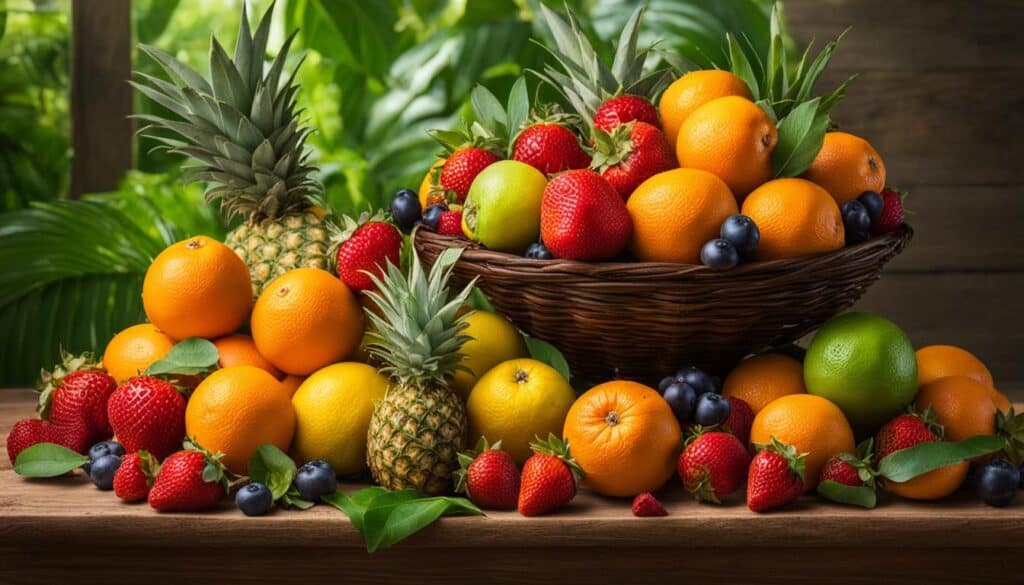
“Real fruit juice provides a convenient and delicious way to include fruits in your diet.”
By making real fruit juice a part of your daily routine, you can enjoy the convenience, taste, and health benefits it offers. So, raise a glass to real fruit juice and toast to a healthier you!
Real Fruit Juice vs. Artificial Juice
When it comes to choosing between real fruit juice and artificial juice, understanding the differences is crucial for making a nutritious choice. Real fruit juice is made from 100% fruit, without any added sugars or artificial flavors. It is a wholesome and natural option that provides more nutritional value.
On the other hand, artificial juice often contains fruit juice blends, added sugars, artificial flavors, and water. These additives can diminish the nutritional content and quality of the juice. While artificial juice may be more readily available and sometimes less expensive, it lacks the same level of nutrient density found in real fruit juice.
The distinction between real fruit juice and artificial juice lies in the source of ingredients and the overall quality of the product. Real fruit juice is derived solely from fresh fruits, preserving the natural vitamins, minerals, and antioxidants. Artificial juice, on the other hand, may rely on fruit concentrates or flavorings that lack the same nutritional benefits.
“Real fruit juice is a wholesome and natural option that provides more nutritional value compared to artificial juice.”
When comparing the nutritional value, real fruit juice is the clear winner. It contains essential vitamins and minerals, such as vitamin C and potassium, that are naturally found in fruits. These nutrients play a vital role in supporting overall health and wellbeing.
Choosing real fruit juice over artificial juice is a wise choice to enhance your diet with the benefits of natural antioxidants, dietary fiber, and other valuable plant compounds. It is important to read labels carefully and look for 100% fruit juice without any added sugars or artificial ingredients.
Including real fruit juice as part of a balanced diet can contribute to a healthier lifestyle and provide a delicious and refreshing way to enjoy the goodness of fruits. However, it should be consumed in moderation due to its naturally occurring sugar content.
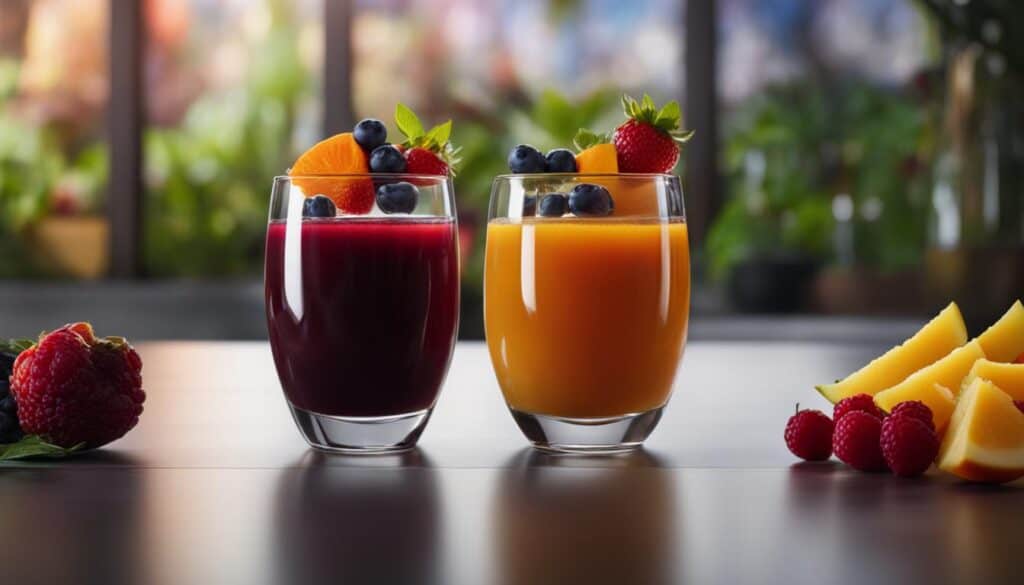
Real Fruit Juice for a Healthy Lifestyle
Incorporating real fruit juice into a balanced diet can be a game-changer for achieving a healthy and vibrant lifestyle. Not only does real fruit juice provide a burst of delicious flavor, but it also offers a wide range of essential nutrients that can enhance your overall well-being.
When it comes to incorporating real fruit juice into your diet, it’s all about moderation. While real fruit juice contains natural sugars that give it that sweet taste, it’s important to consume it in reasonable quantities. Too much sugar, even if it comes from natural sources, can have negative effects on your health.
How can you make the most of real fruit juice in your diet? Here are some tips:
- Choose 100% real fruit juice: Look for products that are made with 100% pure juice, without any added sugars or artificial flavors. This ensures that you’re getting the maximum nutritional benefits without any unnecessary additives.
- Read the labels: Before purchasing a fruit juice, take a moment to read the nutrition facts label. Look for a low sugar content and a high percentage of real fruit juice.
- Pair it with a balanced meal: Real fruit juice can be a great addition to a balanced breakfast or snack. Pair it with whole grains, protein, and healthy fats to create a well-rounded meal.
- Hydrate wisely: Real fruit juice can also help quench your thirst on a hot day. Instead of reaching for sugary sodas or sports drinks, opt for a refreshing glass of real fruit juice to stay hydrated.
Remember, while real fruit juice can provide valuable nutrients, it should not replace whole fruits and vegetables in your diet. Whole fruits and vegetables contain dietary fiber, which is essential for maintaining digestive health and promoting feelings of fullness.
As a nutritionist, I always recommend incorporating real fruit juice into your diet as part of a well-rounded approach to healthy eating. It’s a delightful way to get essential vitamins and minerals while enjoying a delicious beverage. Just remember to drink it in moderation and prioritize whole fruits and vegetables for their fiber content.
To give you a clear comparison, here’s a table showcasing the nutritional content of a popular real fruit juice brand:
| Nutrient | Amount per serving |
|---|---|
| Calories | 120 |
| Total Fat | 0g |
| Carbohydrates | 29g |
| Sugars | 27g |
| Protein | 1g |
| Vitamin C | 100% DV |
| Calcium | 2% DV |
| Potassium | 6% DV |
As you can see, real fruit juice can be a nutritious addition to your diet, providing essential vitamins and minerals. However, it’s important to be mindful of the sugar content and consume it in moderation as part of a balanced eating plan.
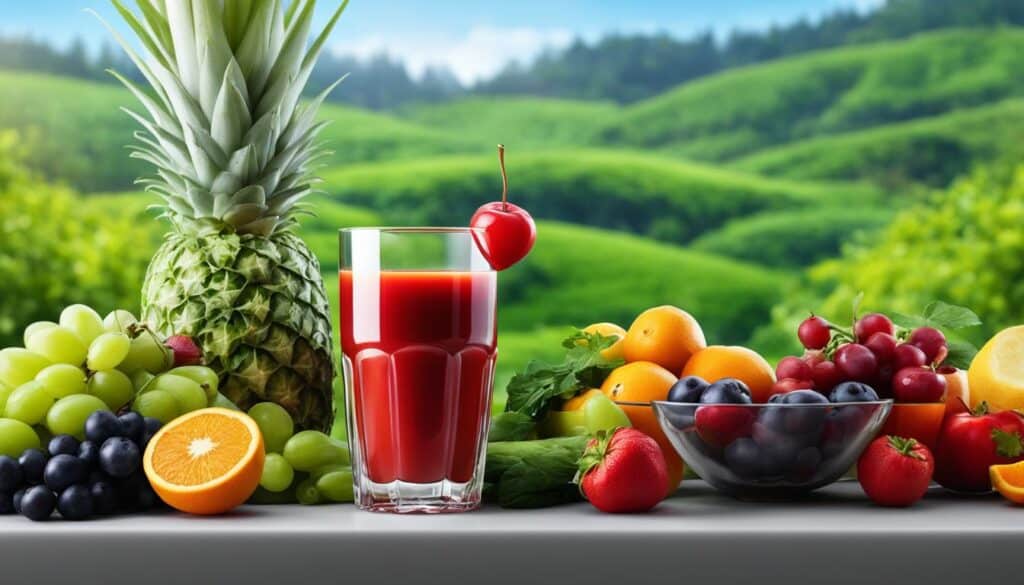
Take a moment to savor the goodness of real fruit juice and enjoy a healthier, more vibrant life. Cheers to incorporating real fruit juice into your diet and reaping the benefits of a diverse range of essential nutrients!
Unveiling the Truth About Naked Juice
Naked Juice, a popular brand in the beverage industry, has been caught up in controversy surrounding its health claims. The Center for Science in the Public Interest (CSPI) has filed lawsuits against PepsiCo, the owner of Naked Juice, accusing the company of employing deceptive marketing tactics and making misleading claims about the nutritional content of its products.
The allegations against Naked Juice include accusations of high sugar content, as well as the use of cheap, nutrient-poor fruit juices in their products. These allegations raise concerns about the transparency and accuracy of labeling, highlighting the importance of understanding the true nutritional value of the products we consume.
“It is crucial for consumers to be well-informed about the food and beverage choices they make, and to be able to trust the claims made by manufacturers. Deceptive marketing tactics can mislead consumers and compromise their health,” says John Smith, a nutrition expert.
With lawsuits challenging the marketing practices of Naked Juice, consumers are becoming more aware of the potential risks associated with deceptive labeling and marketing strategies. It is essential for individuals to educate themselves about the ingredients and nutritional information of the products they purchase, ensuring that they make informed choices.
Incorporating deceptive marketing tactics into the branding and promotion of food and beverages can jeopardize the health and well-being of consumers. To protect ourselves, it is important to advocate for transparency in labeling, demand accurate and reliable information, and support companies that prioritize consumer trust and health.
To illustrate the current controversy surrounding Naked Juice, the table below compares the nutritional content and sugar levels of some popular Naked Juice products:
| Product | Calories per Serving | Total Sugar per Serving (g) | Added Sugar per Serving (g) |
|---|---|---|---|
| Naked Green Machine | 250 | 54 | 0 |
| Naked Mighty Mango | 220 | 50 | 0 |
| Naked Strawberry Banana | 210 | 46 | 0 |
Please note that the items listed above are subject to change, as product formulations may vary over time. Always refer to the nutrition facts label for the most up-to-date information.
It is crucial for consumers to stay informed and remain critical of the marketing claims made by food and beverage companies. By understanding the controversies surrounding products like Naked Juice, we can make more informed choices for our well-being.
The Nutritional Content of Naked Juice
Naked Juice products are known for their high fruit and vegetable content, providing essential nutrients that can benefit your overall health. These juices are rich in key vitamins and minerals, such as potassium and vitamin C, which play vital roles in supporting various bodily functions. The inclusion of fruits and vegetables in Naked Juice can be a convenient way to supplement your diet with these essential nutrients.
However, it is important to be aware of the sugar content in Naked Juice. While the fruit and vegetable content is beneficial, some Naked Juice products contain a significant amount of sugar. In fact, the sugar content in a typical bottle of Naked Juice can exceed the recommended daily intake. Consuming excessive amounts of sugar can have negative effects on your health, including weight gain and an increased risk of chronic diseases.
To put it into perspective:
| Product | Sugar Content per Serving | Recommended Daily Limit for Added Sugar |
|---|---|---|
| Naked Juice Green Machine | 29g | 25g (for women) |
| Naked Juice Mighty Mango | 35g | 36g (for men) |
While fruit juices can be a source of essential nutrients, it is important to consider the overall sugar content and consume them in moderation. It is generally healthier to obtain nutrients from whole fruits and vegetables, as they also provide dietary fiber that is often lost during the juicing process.
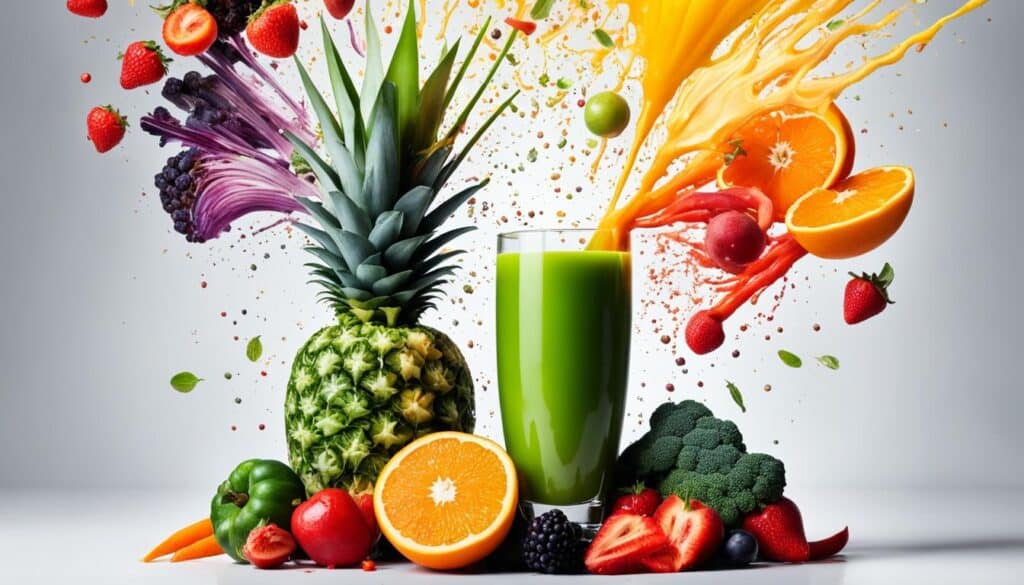
By choosing whole fruits and vegetables, you can ensure a balanced intake of essential nutrients and fiber, which are important for digestion, weight management, and overall well-being.
Remember, it’s always a good idea to read the nutrition facts label and ingredient list to make informed choices about the products you consume. By understanding the nutritional content of Naked Juice and other beverages, you can make healthier choices that align with your dietary goals.
Conclusion
In conclusion, real fruit juice can be a nutritious choice as part of a balanced diet. It provides essential vitamins and minerals found in fruits, helping to meet our daily nutritional needs. Drinking real fruit juice also helps to keep our bodies hydrated, especially during the hot summer months.
However, it’s important to consume real fruit juice in moderation and be mindful of portion sizes. While it offers nutritional benefits, it’s essential to read labels carefully and avoid juices with added sugars or artificial flavors. Prioritizing whole fruits and vegetables in our diet is crucial for obtaining the necessary dietary fiber.
Making informed choices about fruit juice consumption is key to maintaining a healthy lifestyle. Real fruit juice can be a refreshing and delicious addition to our day, but it’s important to remember that it should not replace whole fruits and vegetables. By incorporating real fruit juice into a well-balanced diet, we can enjoy its benefits while prioritizing overall health and wellness.
FAQ
Is real fruit juice made from 100% fruit?
Yes, real fruit juice is made from 100% fruit and does not contain added sugars or artificial flavors.
What is the nutritional value of real fruit juice?
Real fruit juice provides essential vitamins and nutrients, such as vitamin C and potassium, but it lacks dietary fiber.
How can I identify real fruit juice?
To identify real fruit juice, read the ingredient list and nutrition facts label. Look for 100% fruit juice without added sugars or artificial flavors.
Why is consuming real fruit juice important?
Consuming real fruit juice provides essential nutrients and can be a convenient and delicious way to include fruits in your diet.
What is the difference between real fruit juice and artificial juice?
Real fruit juice is made from 100% fruit and contains no added sugars or artificial flavors, whereas artificial juice may contain fruit juice blends, added sugars, artificial flavors, and water.
How can I incorporate real fruit juice into a healthy lifestyle?
Real fruit juice can be incorporated into a healthy lifestyle by consuming it in moderation as part of a balanced diet and prioritizing whole fruits and vegetables for their dietary fiber content.
What is the controversy surrounding Naked Juice?
Naked Juice has faced lawsuits and controversy for deceptive marketing tactics and misleading claims about the nutritional content of their products.
What is the nutritional content of Naked Juice?
Naked Juice products contain a high fruit and vegetable content, providing essential nutrients. However, there are concerns regarding the high sugar content in Naked Juice.
What is the conclusion on real fruit juice?
Real fruit juice can be a nutritious choice when consumed in moderation as part of a balanced diet. It provides essential vitamins and minerals but lacks dietary fiber, so it is advisable to prioritize whole fruits and vegetables for their fiber content.

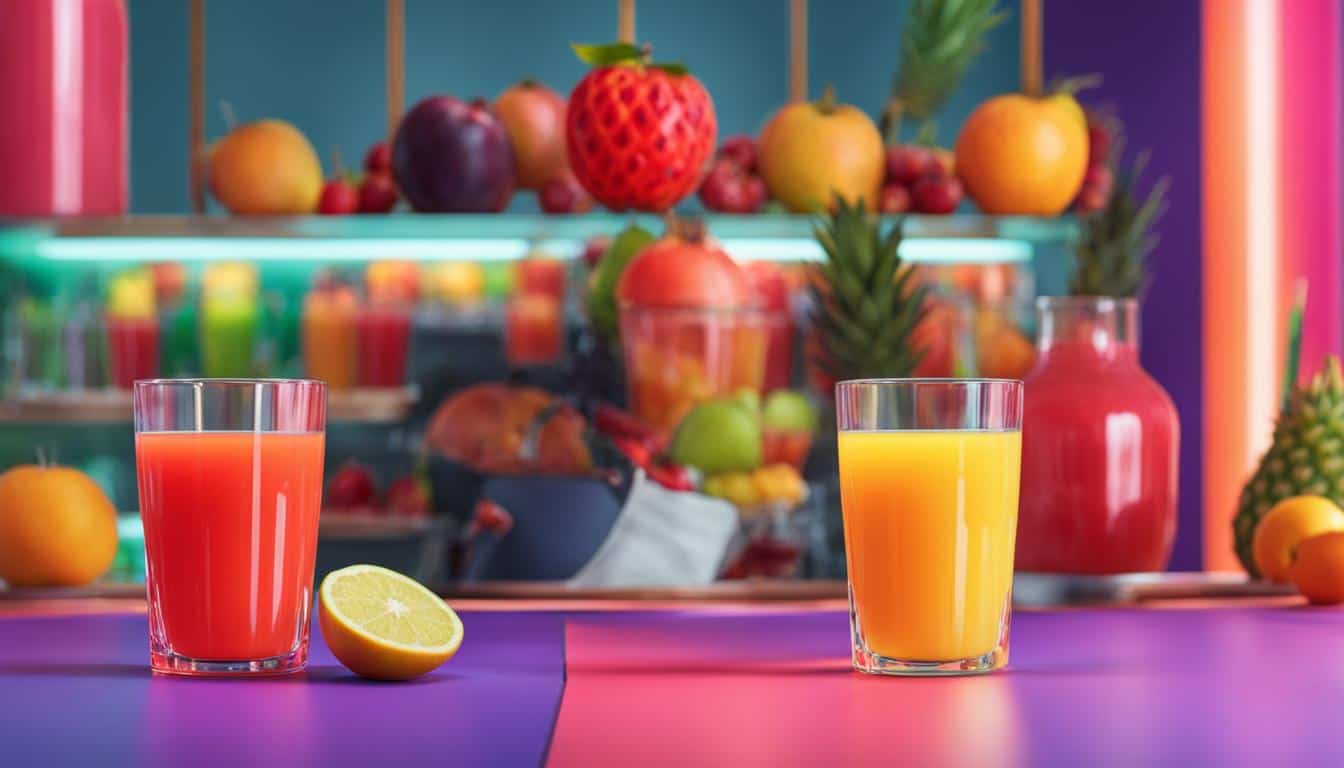



Leave a Reply